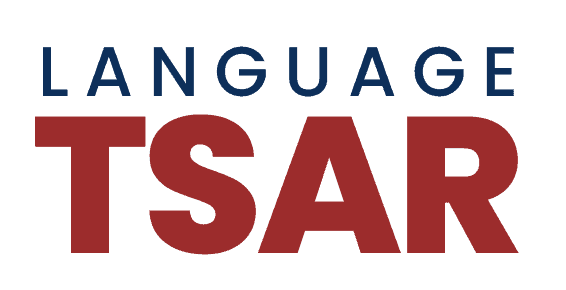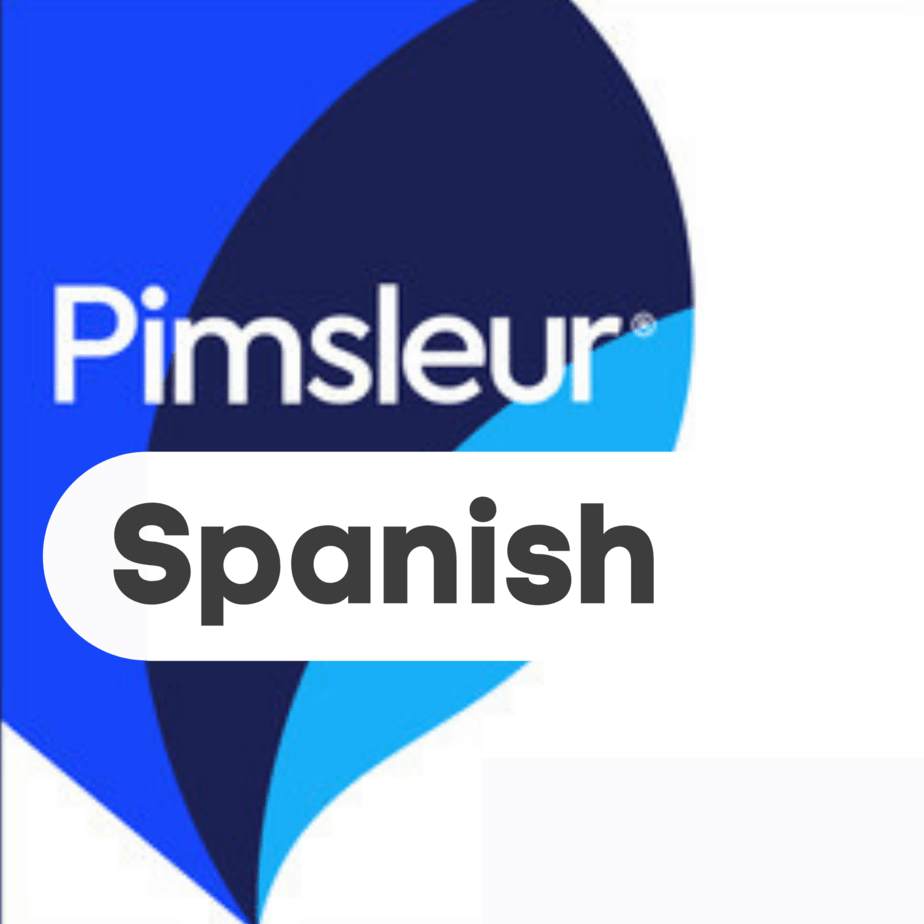- Editor's Choice
Our best choice for Spanish learners of any level, SpanishPod101 has an enormous library video & audio lessons.
- 2nd Choice
An effective & completely immersive teaching method that centers around the central story “El Hombre Del Sombrero”.
- 3rd Choice
An audio-only language app that uses authentic dialogues and spaced repetition techniques to develop effective conversational skills.
Has the coronavirus got you stuck at home, wondering what to do with yourself? Dreaming of travelling to Spain or South America when travel finally opens back up again? Why not use this new-found time to brush up on your Spanish skills!
Learning Spanish doesn’t have to be boring. For some, the phrase ‘language learning’ conjures up drab ideas of school classrooms, grammar textbooks, or mindless repetition drills…
If you cringe at the idea of hitting the language books, then you’ll be very glad to know that there’s plenty of very affordable apps for your smartphone to learn Spanish very effectively and completely in your own time. Heck, it might even be fun!
So let’s jump right in. Here are the best apps for learning Spanish from the comfort of your own home.
Vamos!
Best Overall
SpanishPod101 takes our number one spot for the best all round Spanish-learning app. It’s a great option for anyone of all levels and it’s engaging video and podcast teaching style keeps the lessons varied and interesting enough to avoid getting bored whilst still immersed in learning new phrases, vocab and grammar. The hosts are all native speakers with very likeable personalities. Overall, the lessons are very laid back and fun with lots of insightful cultural tangents thrown in to spice things up.
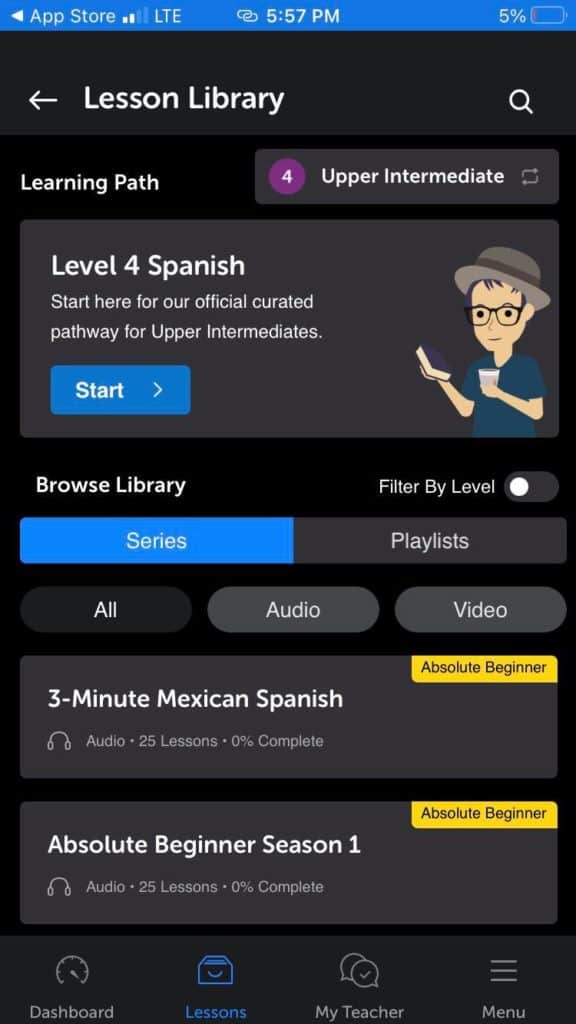

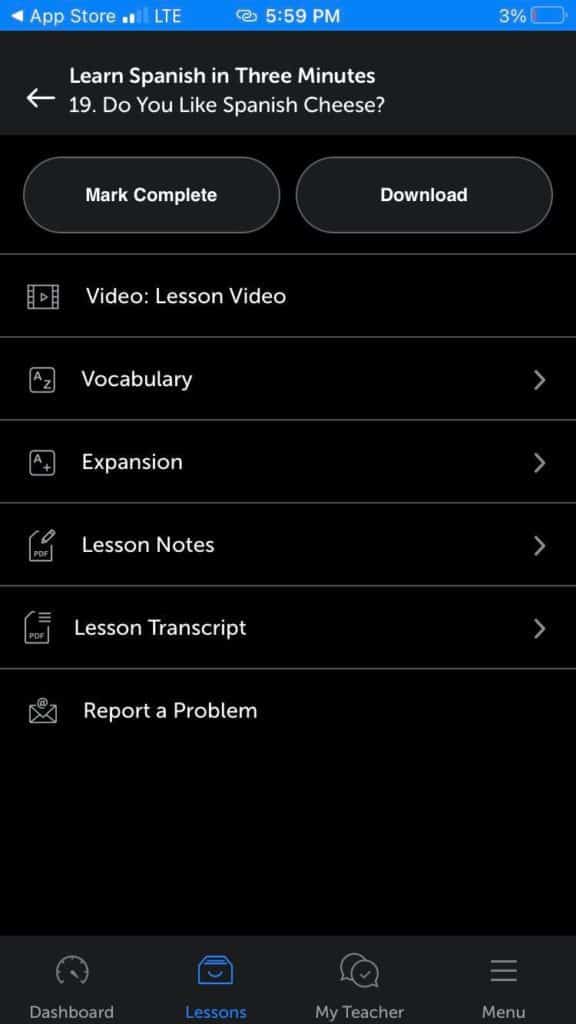
It’s a very different methodology to most apps, with a completely flexible syllabus that allows you to pick and choose what you wish to learn. And the learning time doesn’t just stop at the lessons, the app also includes integrated SRS flashcards, an entire library of vocab lists, a most common 2000 words list, among other features. You can sign up for a free premium trial or take advantage of our discount codes to get up to 77% off.
Pros
- Massive library of content
- Flexible learning style
- Downloadable & available offline
- Engaging, native hosts
Cons
- Syllabus can feel unstructured
- Too much English, not enough immersion
- Most common words list is translated directly from most common English words
Price:
Effectiveness:
User Experience:
Most Effective
Unlike SpanishPod101, Spanish Uncovered doesn’t have a dedicated app, however the course (on teachable) can be accessed through any mobile device, and all the content can be downloaded for offline learning. Spanish Uncovered takes second place on our list due to it’s proven teaching method that’s based on Olly Richard’s (the founder) unique StoryLearning® concept.

The 20-module course takes a complete beginner and gets them right up to an intermediate level through a series of video lessons & exercises that each focus on a chapter in an overall story. Weaving a central plot throughout the entire course is an excellent way to keep you gripped – every chapter finishes on a new cliffhanger! There’s a heavy emphasis on immersion, allowing you to develop your own fluency through the test & audio, without a bunch of grammar rules and translations being forced down your throat.
Click here to check out our full review of Spanish Uncovered.
Pros
- Well-thought out curriculum
- Enjoyable learning method
- Professional videos with thorough explanations
Cons
- No dedicated mobile app
- The video lessons can be a bit on the long side
- Expensive
Price:
Effectiveness:
User Experience:
Best Speaking, Listening & Pronunciation App
The Pimselur method has been around for decades, now a well-known name in the language learning space. Although several other Pimselur courses are often criticised for the content being too formal or inauthentic, Pimsleur Spanish is one of their best courses, with many raving reviews of students who have successfully completed the course and quickly achieved an intermediate level of speaking and listening.
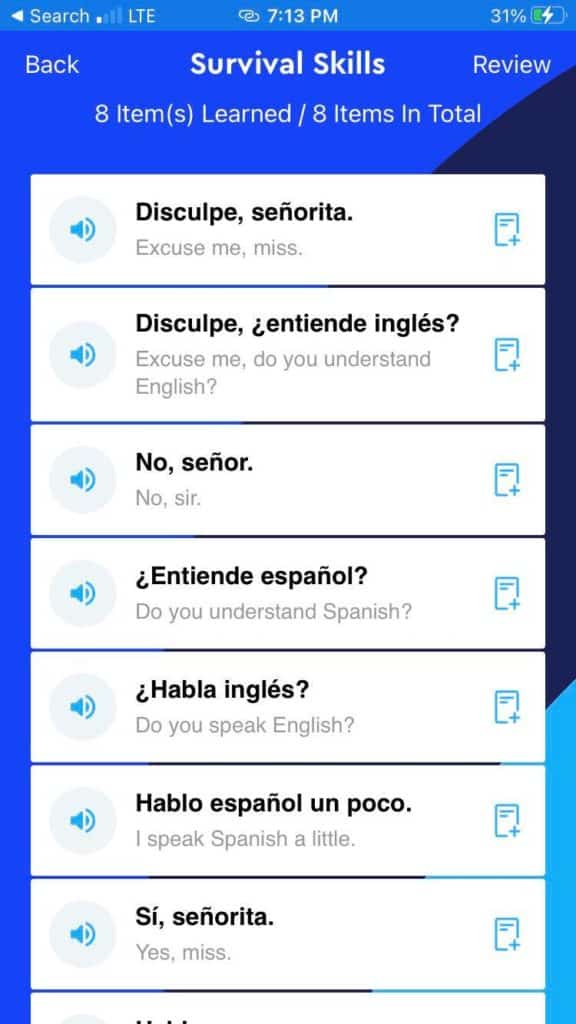
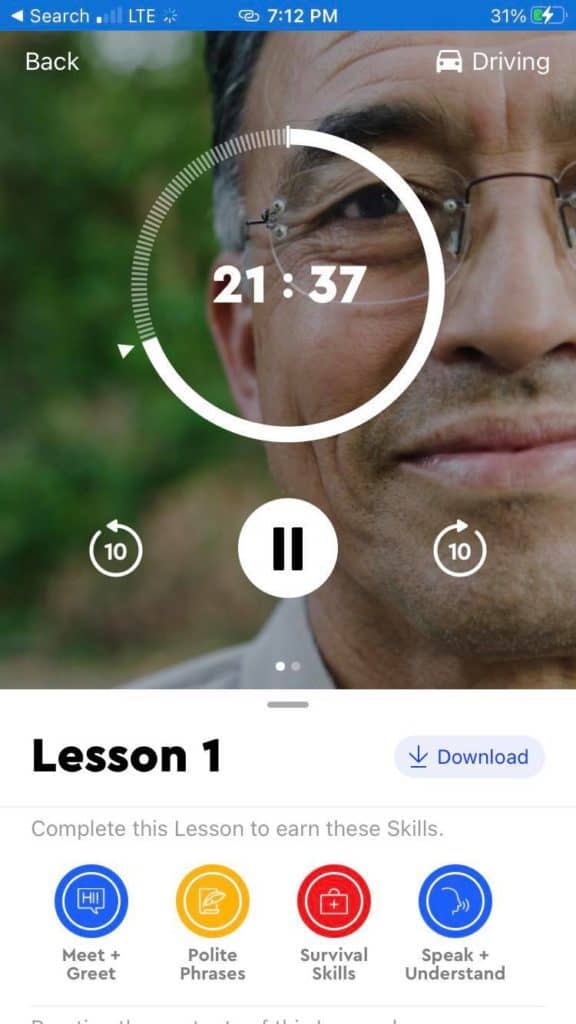
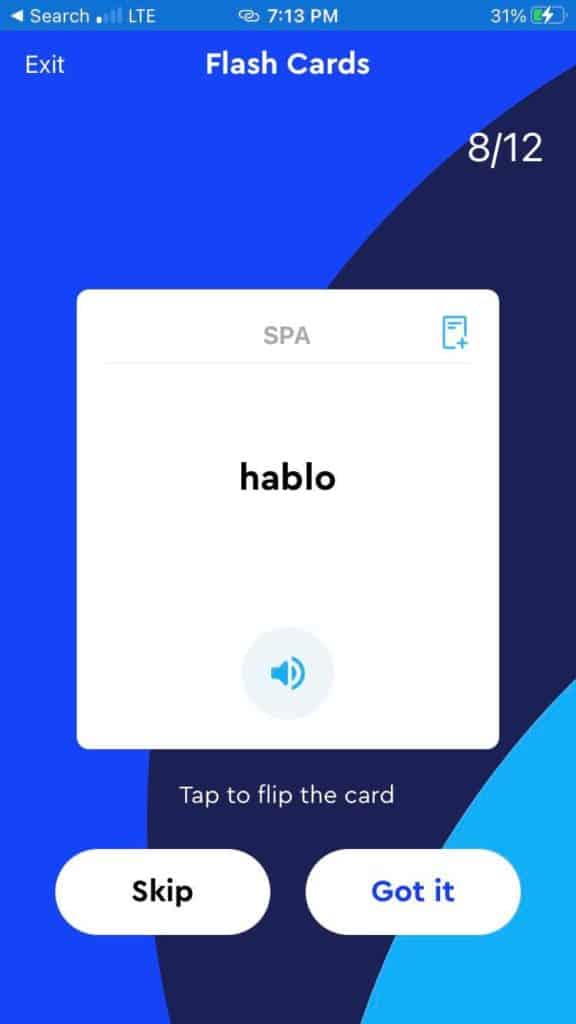
It’s convenience is a huge factor, with everything being (mostly) audio only, allowing you to learn when travelling, exercising, washing up or on a daily commute. The lessons are around 30 mins on average and first expose you to a natural dialogue. The tutors then proceed to break everything down into its most basic components, getting you to repeat each phrase and perfect the pronunciation.
The method, based upon Dr Paul Pimselur’s research, uses spaced repetition to solidify what you learn, continually testing you throughout each lessons.
Pros
- Intuitive app
- Structured syllabus teaches you useful phrases from lesson 1
- Based upon established research
Cons
- Very little content for reading or writing
- No grammar explanations
Price:
Effectiveness:
User Experience:
Best for Conversation Practice
Maybe you can’t get to a Spanish speaking country right now. After all, the best way to learn Spanish is to be surrounded by the language and speak with locals on a daily basis, no matter how basic the conversations are. So what’s the next best thing? HelloTalk is our best pick for the most effective and affordable language exchange app (in fact. it’s free!)
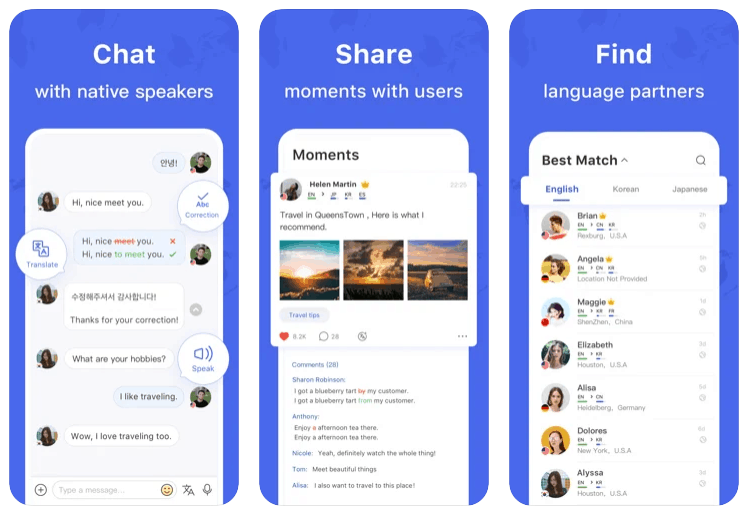
HelloTalk pairs you up with a native speaker who is also seeking some language pactice for a language you already possess (perhaps English or French). You can meet regularly over voice call or chat to talk about different topics and correct each other’s language through their built-in error correction feature. They make it nice and easy to schedule time and ensure you spend equal amounts of time speaking each other’s target language. If you are looking for options that focus purely on Spanish then we recommend italki, or preply, though bear in mind that these are paid tutoring services.
Pros
- Handy error correction system (built into the chat)
- Some bonus features, such as live classes, offline lessons etc.
- Can make friends and have meaningful cultural exchanges
Cons
- Ads can be a little annoying (you can remove them with the paid version)
- Partners can often be unreliable or absent
Price:
Effectiveness:
User Experience:
Best for Immersive Listening Practice (& Vocab Building)
Another brilliant supplementary tool that would be great to use alongside a more comprehensive course like SpanishPod101 or Spanish Uncovered. Besides listening to podcasts, FluentU is my go-to app for getting exposure to a new language and culture, by exploring a wide variety of authentic Spanish videos that are designed for a Spanish audience. What’s great about FluentU is that the app is so easy to use. You can filter by level and the type of media you’re after, whether it’s sports or cooking, music videos or how-to videos.
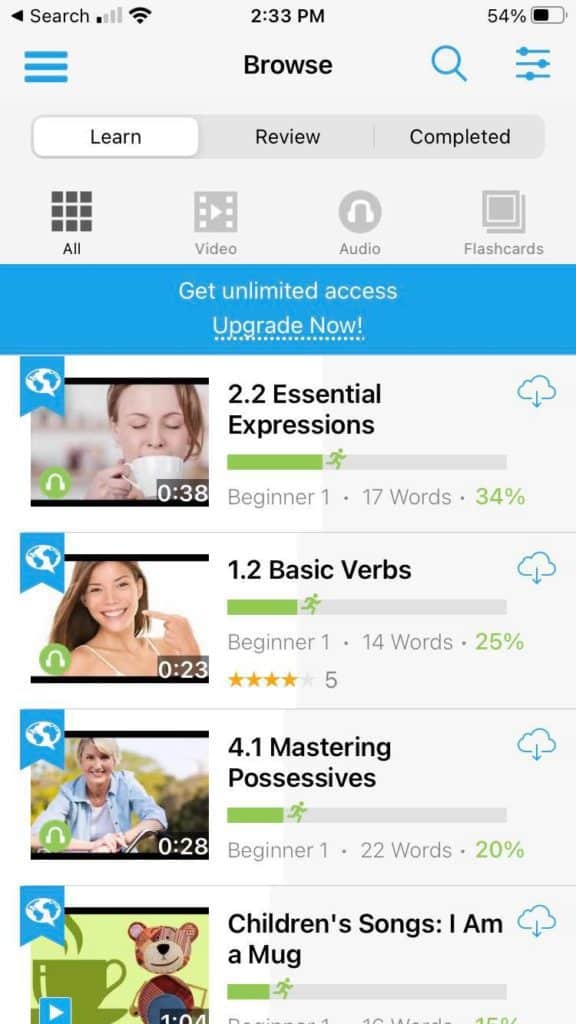

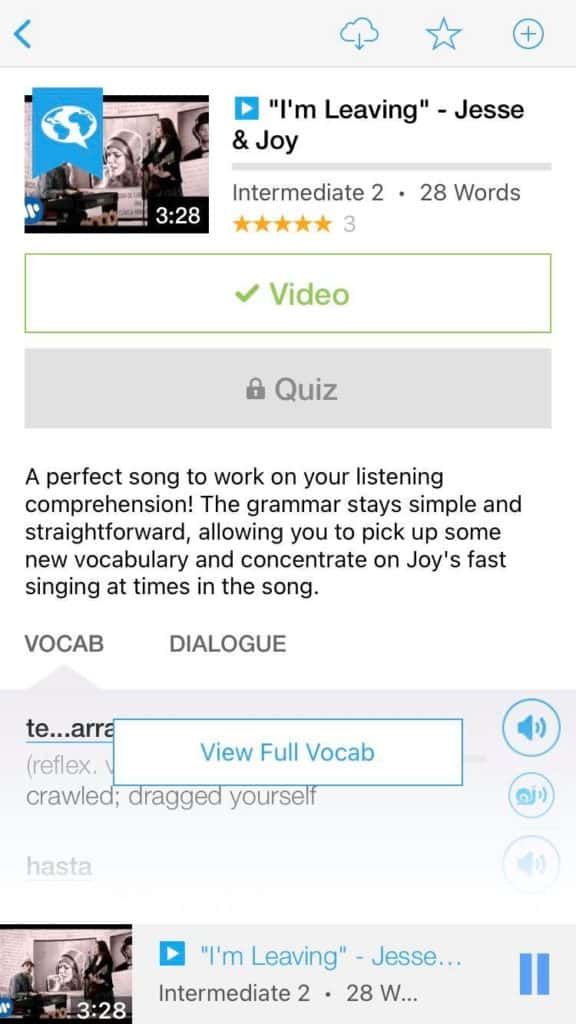
You can toggle on/off the subtitles to test out your listening skills, and selecting a word will give you several example videos of where that vocab term is used in other contexts. You can then add a word to a flashcard deck or your personal word bank. After each video is a gamified quiz to test you on your newly acquired vocabulary. The app will prompt you to review these words over time to engrain them in your mind. Very cool!
Pros
- Simple, intuitive app
- Uses SRS methods to build upon your existing vocabulary
- Literally 1000s of videos on a wide range of topics
- Exposes you to different accents and contexts
Cons
- Doesn't teach you any grammar or language theory
- Improves passive skills only
- Sometimes the videos are double subtitled which is very annoying (the videos are pulled in from YouTube)
- Expensive for what's essentially just a supplementary learning tool
Price:
Effectiveness:
User Experience:
Runners-up for Best App for Learning Spanish:
Still hungry for more? Here’s some of our favorites that didn’t quite make the cut.
Rocket Spanish is great for those who like to follow a linear syllabus that teaches you everything from the very beginning. The lessons are varied with a mix of dialogues, culture, vocab and grammar. One of the main things that stands out with the rocket courses is the voice recognition software. It’s rare to find a course that focuses enough on speaking so it’s great to see the ability to record yourself, get feedback and essentially take part in the dialogues & role plays.
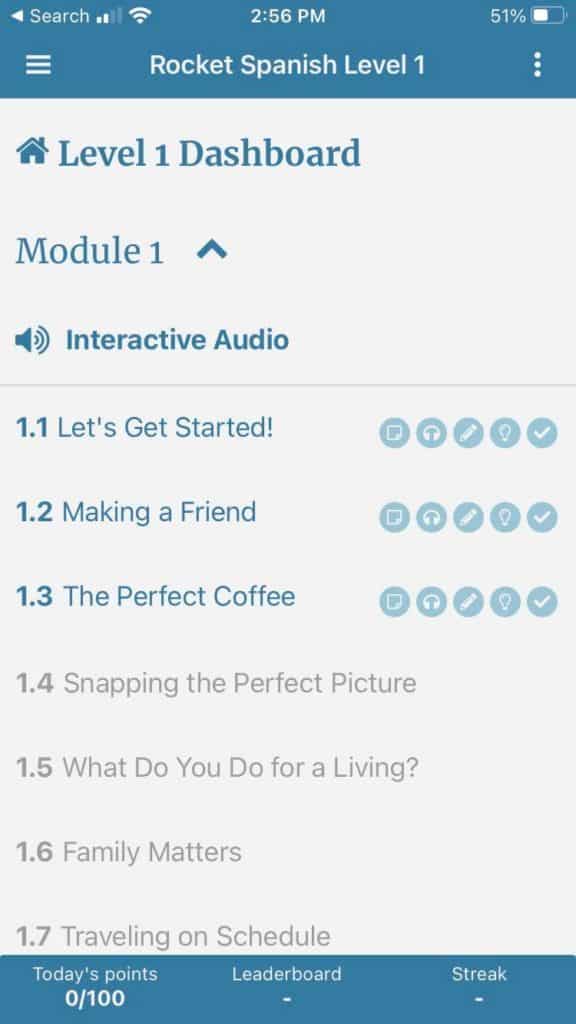
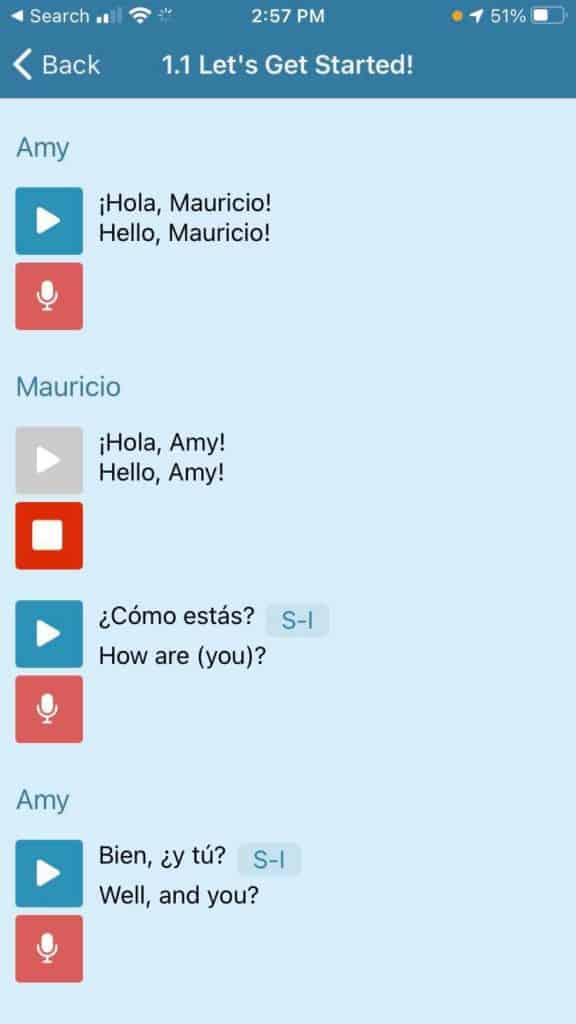

However, the exercises can be very long. Whilst there are quite a few different styles of exercises, they are all based on pure memorisation through flashcards etc. For those who can stick with the course, they’ll get a load of value from it, however I suspect most people quit due to boredom from the lack of videos, stories or authentic material to keep you engaged and motivated to continue.
Pros
- Detail explanations with plenty of examples
- Natural voice clips with record yourself comparisons
Cons
- Lack of varied exerciese
- Voice recognition software does not always work properly
- Rigid curriculum
Price:
Effectiveness:
User Experience:
Ouino, pronounced ‘we know’, is an affordable all-round language app that provides Spanish practice in reading, writing, listening and speaking. Each lesson contains a mixture of videos, audio lessons, exercises and games. We like that you have the freedom to choose which skill you wish to work on, so you don’t have to follow their linear syllabus if you don’t want to. The layout is also very nice on the eye and it’s very easy to navigate.
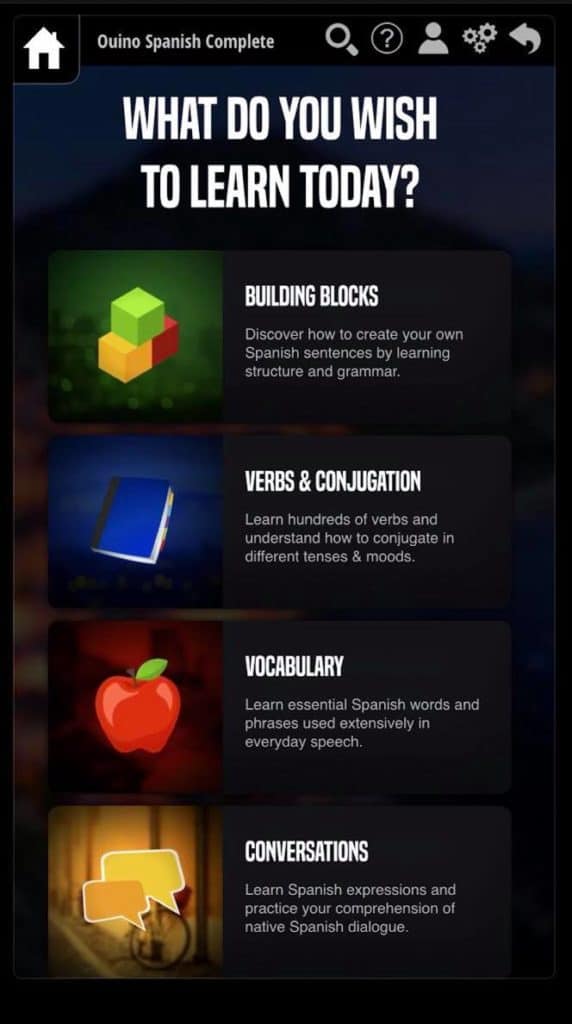
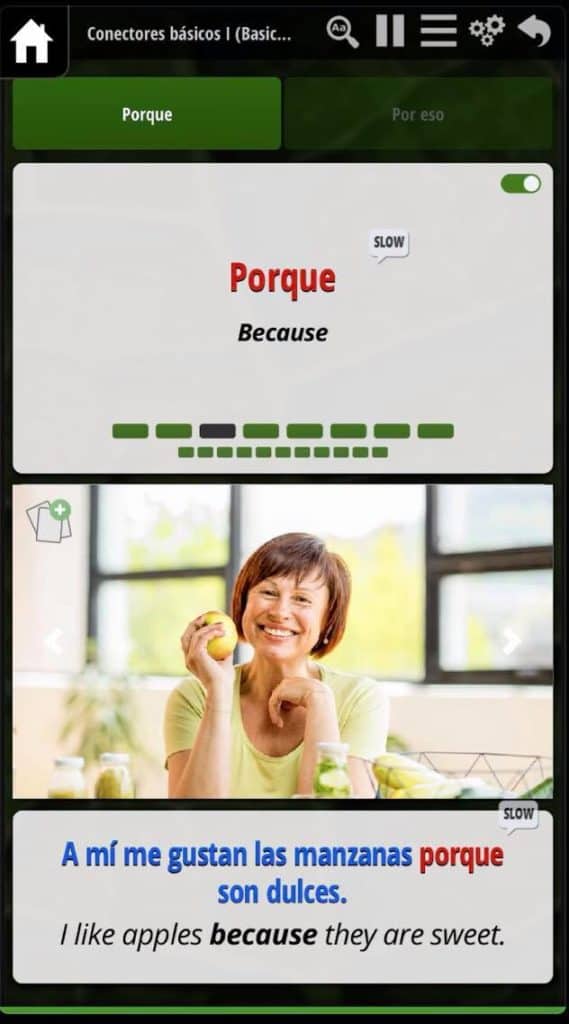
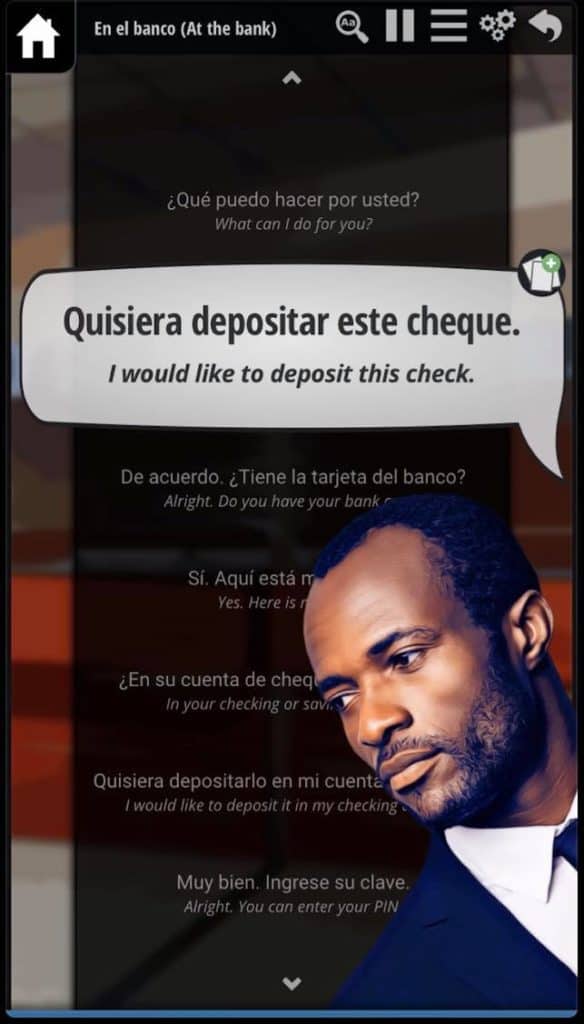
Perhaps Ouino takes inspiration from duolingo with it’s built-in games & motivational features. Some of the games we felt were a bit too gamified, however. For example, we found ourselves under a lot of stress to complete the exercises before the clock finished, to the extent that we were sometimes answering randomly instead of taking the time to think through the answer properly. Overall, it’s not a bad app to learn Spanish. For those who like to have interactive features and games it could be a great option.
Pros
- Highly gamified
- No overload of information
- Reasonably priced
Cons
- Can only be used online
- Lacks variation - all lessons are very similar
Price:
Effectiveness:
User Experience:
Everyone’s heard of duolingo. The app has sprung into the limelight in recent years for being one of the most gamified free language apps on the market. It’s certainly fun to play with, but is it any good? We’ve included it on our list because it’s not a bad option for anyone looking for a taste of the language without any upfront investment, however if you are serious about learning Spanish then we recommend leaving it alone and instead following a more comprehensive tailor-made language program like Spanish Uncovered.
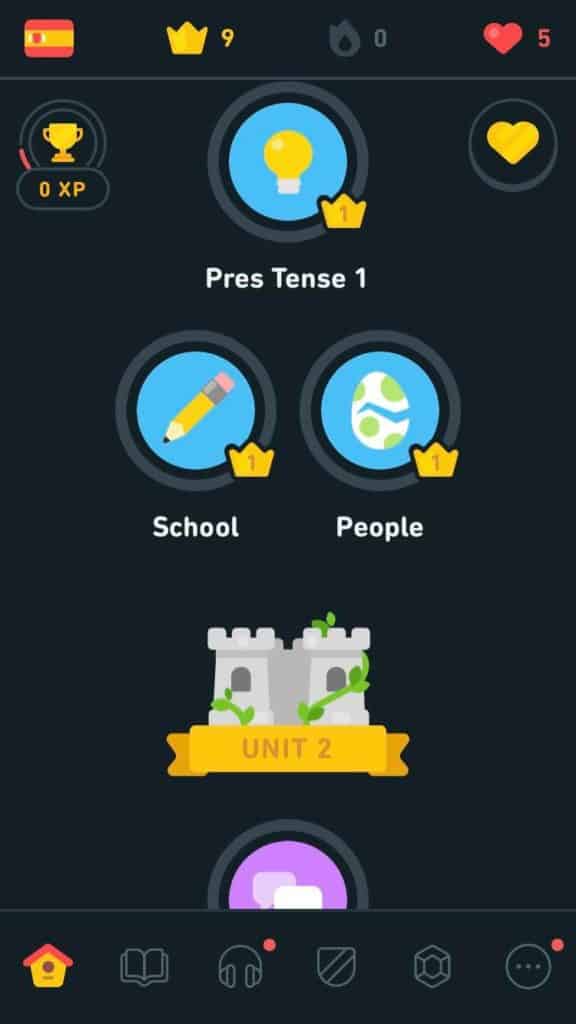
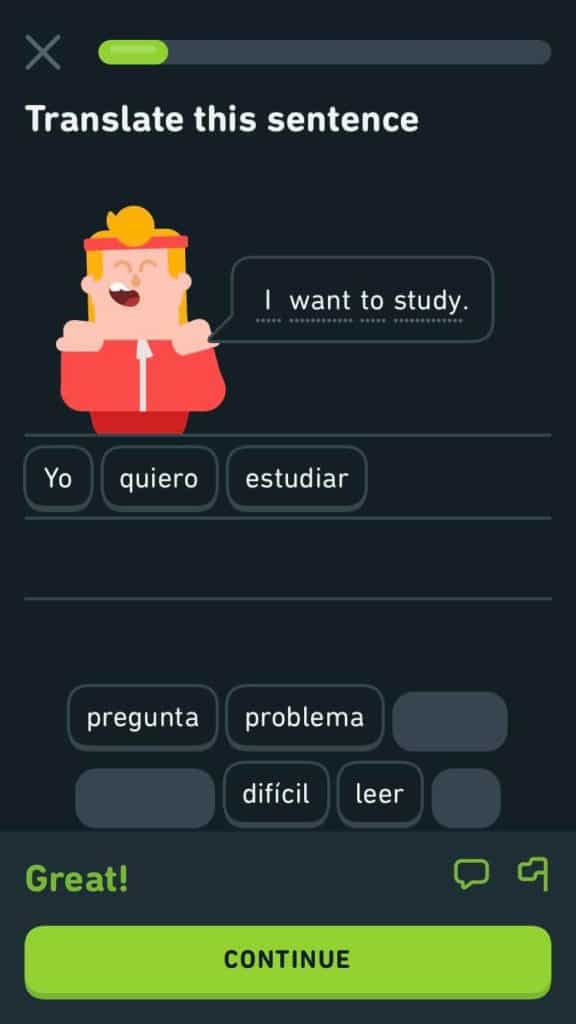

The problem with Duolingo is that many of the phrases are automatically translated, allowing for errors and unnatural sounding phrases to sneak in – not good! However, there’s now a bunch of additional features on the app which we like the look of, such as short audio lessons & podcasts. It’s worth downloading the app just to check these out.
Pros
- Fun to use, interactive quizzes
- Structured syllabus
- Podcasts, audio lessons & more
- It's free!
Cons
- Often contains translation errors
- Requires payment to refill hearts, otherwise you must wait
- The free version has many ads
Price:
Effectiveness:
User Experience:
Last on our list is not a language learning app but rather a useful tool to help you along your journey to Spanish fluency – a dictionary app. It’s important to have somewhere to quickly look up words when learning a new language, and although google translate does the job there’s much better apps out there that are specifically designed for language learners. Linguee is one of them. It’s much more than just a dictionary, it’ll remember all the words you look up and send you a notification a few days later to test you on the definition. It’s search feature is great too. It’ll not just provide the definition but lots of example sentences from a range of contexts, each with accompanying audio file for pronunciation.
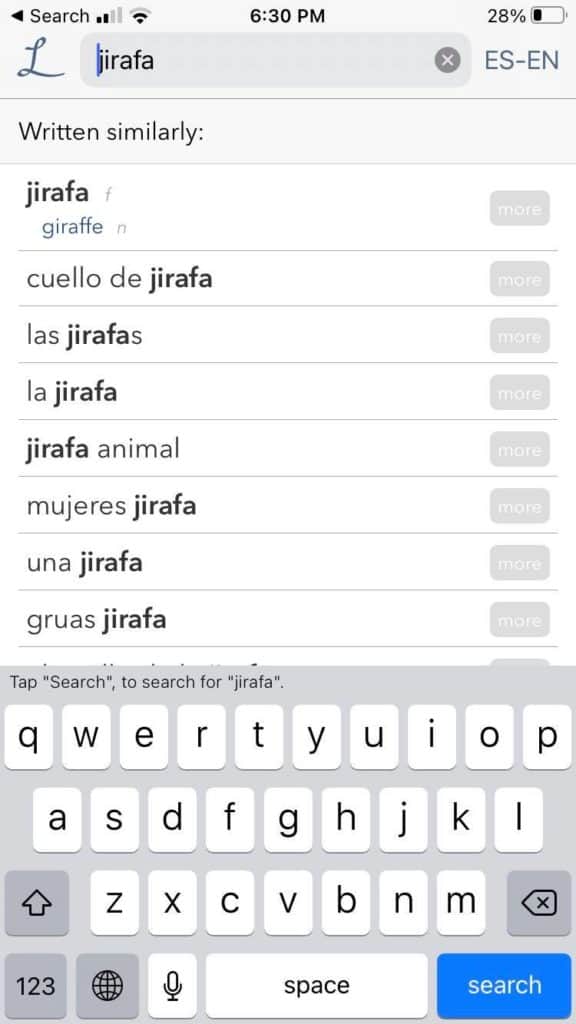
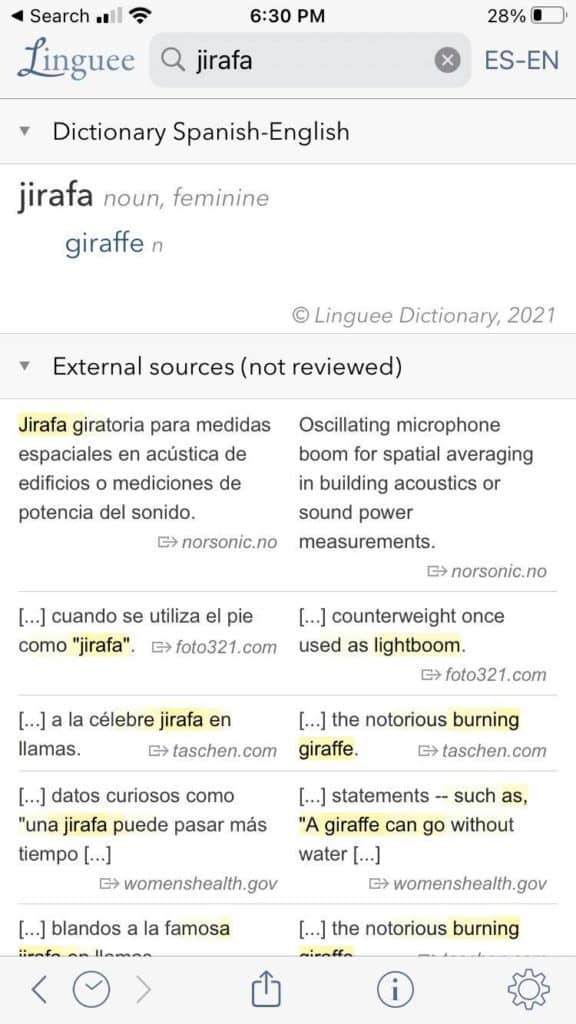
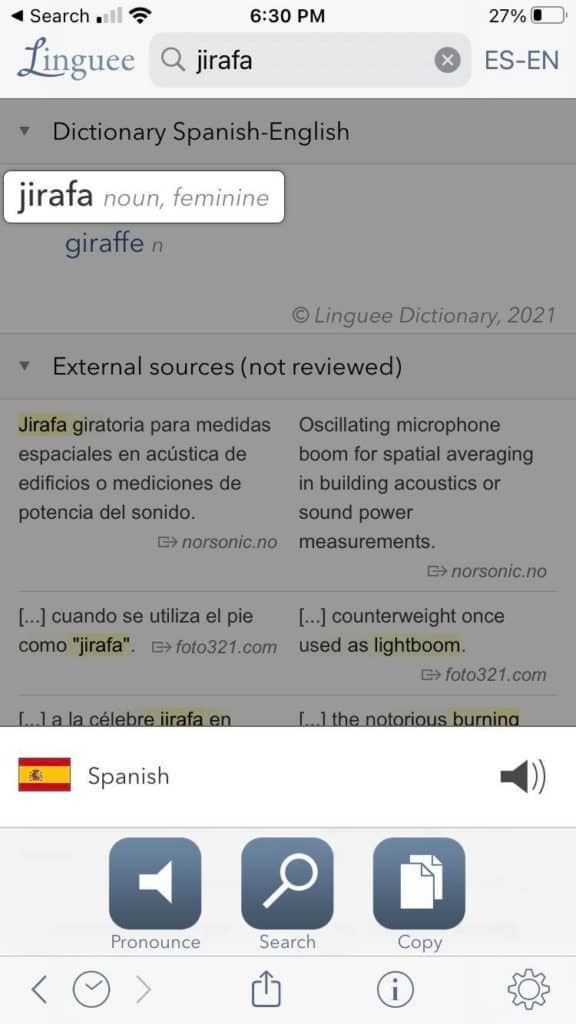
The app can be used in conjunction with othr apps or when browsing the internet. You can just highlight the word or phrase and select Linguee to search or ponounce the word/phrase. Plus, it’s free and there’s no ads! Awesome.
Pros
- Simple layout, easy to use
- Available offline
- Automatic notifications to test your memory of new vocab
Cons
- Can be laggy - starts searching the moment you type something
- Examples are of the exact search term, no conjugations
Price:
Effectiveness:
User Experience:
The Best Apps For Learning Spanish: Conclusion
So there you have it, now you know all of our top picks of Spanish learning apps. Why not try some of them out? After all, it’s important to find which method works best for you. Some people can binge watch FluentU all day, absorbing new words & phrases, whereas other people prefer a more structured syllabus like Spanish Uncovered or Rocket Spanish. Or you might want to just focus on a particular skill, for example by improving your speaking with HelloTalk, or conversational skills with Pimsleur Spanish. Whatever you choose to go for, you can’t really go wrong with this list.
Have fun & buena suerte!

Josiah is a digital nomad with a passion for language learning and adventure travel. He’s taught English as a foreign language for many years and is currently learning Georgian, French and Chinese.

